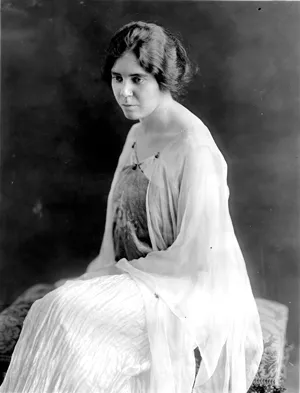Women's Rights Activist Alice Paul, Class of 1905, Celebrated in "Suffs," Tony Award-Winning Broadway Musical

Alice Paul, Class of 1905, is known as a Quaker, leader in women's rights and non-violent resistance, advocate for the 19th Amendment, and an author of the Equal Rights Amendment. At Swarthmore, Paul majored in biology and also studied political science and economics. Her often-overlooked legacy is now celebrated in Suffs, a new Broadway musical garnering significant acclaim.
At Sunday’s Tony Awards, Suffs won Best Original Score and Best Book of a Musical. The production was also nominated for Best Musical, Musical Costume Design, Musical Featured Actress, and Musical Direction.
Suffs blends historical accuracy with contemporary relevance, telling the story of the women’s suffrage movement in early 20th-century America and underscoring present-day setbacks in gender equality. The all-female cast reenacts events from 1910 to 1920 that led to the passage of 19th Amendment, which granted (primarily) white women the right to vote.
“It’s historic and relevant, and it’s emotional, and it shows the relationships among these women who fought so hard to get us the right to vote,” Hillary Clinton, a co-producer of Suffs, told The New York Times.
Variety says Paul is portrayed as “a young firebrand” with “an offbeat underdog charisma… commanding the stage by force of will and wits — clearly a character not to be overlooked or underestimated, but always appealing.” She is played by Shaina Taub, who wrote Suffs’ music, lyrics, and book.
Paul’s work in the suffrage movement continued efforts by the Votes for Women campaign, established by College founder Lucretia Mott. Paul’s grandfather, William Parry, is another of the College’s Quaker founders who, alongside Mott, broke ground for the planting of the first trees on campus. Her mother, Tacie Parry, was among the College’s first class of students in 1878.
Suffs depicts one of Paul’s most notorious actions, the Women’s March of 1913. On March 3, 1913, Paul led the first massive demonstration of women’s rights activists in Washington. The suffragists, including some of Paul’s friends from Swarthmore, marched down Pennsylvania Avenue the day before Woodrow Wilson's presidential inauguration, previewing the organized dissent they would continue throughout his presidency.
In 1916, Paul founded the National Women’s Party. A year later, she was imprisoned for seven months for protesting at a banquet. While in jail, she organized a hunger strike which prison officials responded to by brutally force-feeding her. Newspapers published the abuse she suffered, amplifying public support for suffrage and scrutiny of the White House. In 1918, President Wilson could no longer withstand the public pressure and announced that he would support women's suffrage.
Ratification of the 19th Amendment was hard won, but it excluded most Asian, Black, Latina, and Native American women. It took the Voting Rights Act of 1965 to ensure all American women could vote. Now, nearly 60 years later, the fight for gender equity continues as reproductive rights, equal pay, and health care are key women's rights issues in the upcoming presidential election. Women, the largest group of registered voters, are poised to play a pivotal role in the election’s outcome. As Paul once said, “Unless women are prepared to fight politically, they must be content to be ignored politically.”



